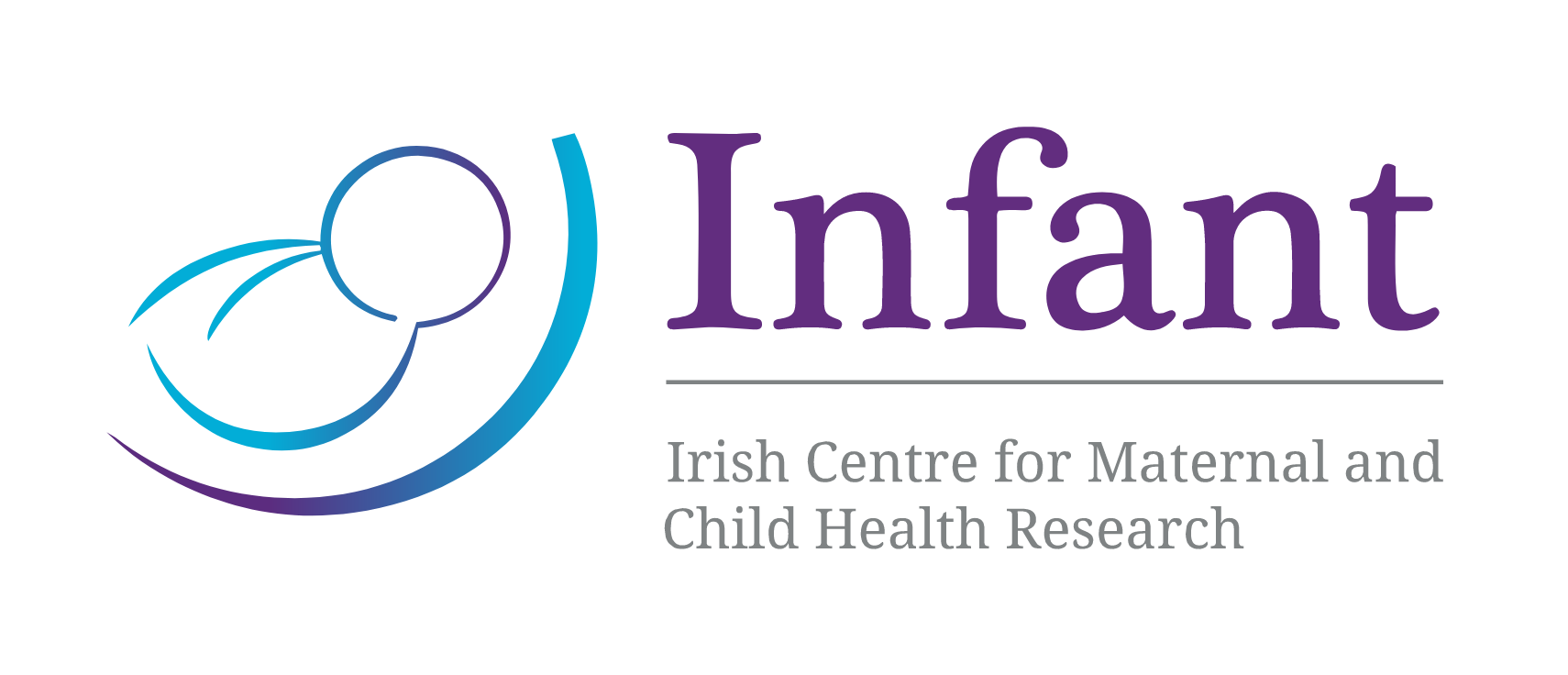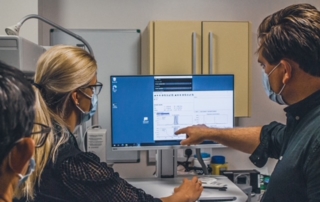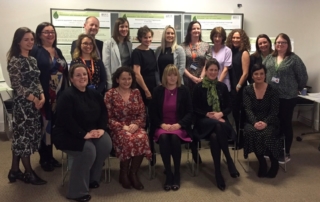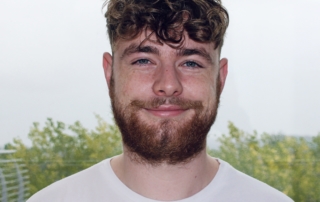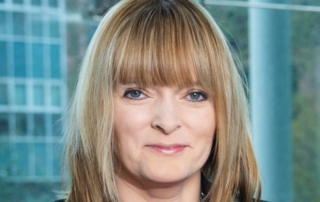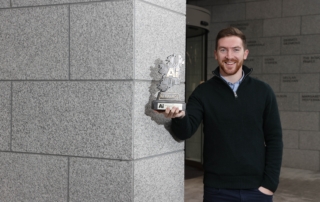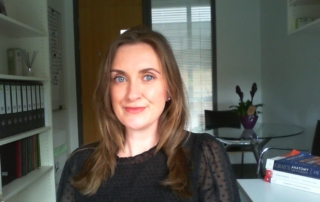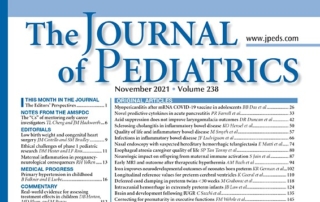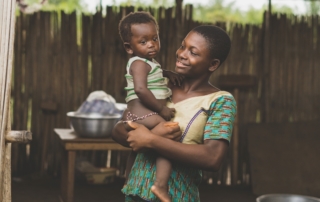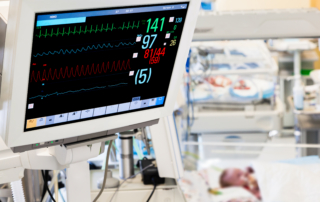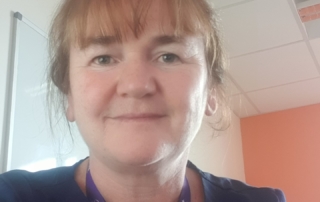INFANT Centre News
INFANT Seminar Series: Dr Kirsten Dowling to Discuss Predictive Biomarkers for Autism Spectrum Disorder: A Metabolomics Profiling Study in the Cork BASELINE Birth Cohort
Autism Spectrum Disorder (ASD) is a neurological, developmental disorder that affects communication and behaviour. Currently, there is a lack of understanding about the aetiology of ASD and children are not diagnosed reliably until they are at least 3 to 4 years of age. Henceforth, there is an urgent need for the identification of diagnostic biomarkers for the prediction of ASD. Metabolomic profiling was undertaken on cord blood plasma from ASD cases vs gender matched controls from the Cork BASELINE Birth Cohort using Liquid chromatography-tandem mass spectrometry. Clinical data (maternal and child BMI, birth weight, gestational age, health and lifestyle etc.) were combined with metabolite peaks to explore machine learning (ML) algorithms: t-test, partial least squares-determinant analysis (PLS-DA) and random forest (RF). We profiled 2612 compounds and 18 clinical variables to identify the top predictive metabolite and clinical features for the development of ASD. RF feature selection resulted in the highest performing 20 metabolite subset, and pathway analysis revealed significant alterations in 5 metabolic pathways. Dr Kirsten Dowling will deliver her presentation on Friday, February 11 at 12 pm.
INFANT PhD Profile: Dr Emily O’Connor’s Work to Standardise The Way Reviews of Perinatal Deaths Occur
Dr Emily O’Connor is pursuing a PhD in the area of perinatal medicine with INFANT and NPEC at UCC. Her background includes previous work as a Specialist Registrar in obstetrics and gynaecology with the Royal College of Physicians in Ireland (RCPI). Emily is extremely passionate about improving our maternity and perinatal services as well as improving the experience of parents who use those services. Emily’s planned thesis is titled: Structured Evaluation and Implementation of a National Perinatal Mortality Review Tool for Ireland. Her research is funded by Féileacáin, the Stillbirth and Neonatal Death Association of Ireland. Perinatal deaths encompass babies who die before they are born (stillbirth), during labour or delivery (intrapartum death) or after birth (neonatal death). The Irish perinatal mortality rate has remained stable over the last ten years but has not decreased over this period. Emily’s work aims to standardise the way reviews of perinatal deaths occur by developing and implementing a national perinatal mortality audit tool for all perinatal deaths occurring in every maternity unit across Ireland. A major focus of this work is the involvement of bereaved parents in the review process. The aim of this research is to offer a more inclusive, transparent process for parents who have experienced the loss of their baby. Emily is conducting this research with the Pregnancy Loss Research Group based at INFANT and the NPEC. Her supervisors are Professor Keelin [...]
INFANT Researchers Assess Novel Optical System to Monitor Lung Function in Babies
Researchers at University College Cork’s INFANT Centre recently commenced a study of a new non-invasive optical device that may provide real-time information on the lung function of newborn babies. By using light-emitting technology, this novel system incorporates sensors placed on a baby’s chest to detect oxygen levels in different regions of the baby’s lungs. ‘This system has the potential to significantly alter the way we monitor babies in the neonatal intensive care unit, especially preterm infants and term babies on mechanical ventilation', according to Professor Eugene Dempsey, the Horgan Chair in Neonatology at UCC, Clinical Lead for Neonatal Research and Principal Investigator with the INFANT Research Centre. ‘Not only can we potentially monitor them more closely in real-time, but we can reduce X-ray exposure and limit blood tests being performed’ he added. One month old, Elodie Fitton, was the first baby to take part in the study after her parents, Cora Shorten and Kieran Fitton, were approached to take part in the project called NIOMI (Non-Invasive lung Oxygen Monitoring of Infants). ‘We agreed to have Elodie take part as the first baby in this study. We believe as parents this study could help many of those sick and vulnerable babies in a situation where they need more care and monitoring’. ‘As this was a non-invasive study it made sense for Elodie and us to be [...]
Pregnancy Loss Research Group Secures IRC funding to Enhance the Translation of Pregnancy Loss Research into Policy and Practice
Professor Keelin O’Donoghue, Lead of the Pregnancy Loss Research Group, together with the Irish Hospice Foundation as civic society partner, has been awarded an Irish Research Council New Foundations Award 2021 to enhance the translation of pregnancy loss research into policy and practice through a project titled PLATFORM: Pregnancy Loss knowledge trAnslaTion FOR iMpact. The project will bring researchers, key civil society partners and other knowledge users – including parent advocates – together to identify barriers and facilitators to knowledge translation, and develop activities and outputs in an effort to address the decades-long lack of progress in implementing change at policy and practice levels. PLATFORM will contribute to enhancing Irish public and policymaker awareness of pregnancy loss, provision of more effective services/supports within the health care system, community sector, and beyond, and influencing policymaking and healthcare funding. The project was developed in part following input from parent advocates on public and patient involvement group for an ongoing research project (RE:CURRENT); they voiced the need for parents to hear about pregnancy loss research that is being undertaken, as often they feel that it is a neglected area. Announcing the New Foundations 2021 recipients, Director of the Irish Research Council, Peter Brown, said: “In addition to the 55 projects announced today that will collaborate with civic society partners, we are also delighted to renew our ongoing partnerships [...]
INFANT Seminar Series: Dr Colin Hawkes to Discuss His Research Into Diabetes
Our INFANT seminars will resume on Friday, January 28th at 12pm. We are delighted to welcome Dr Colin Hawkes, paediatric endocrinologist as our first speaker of the new year. Dr. Hawkes will present Clinical & Academic Synergies in Type 1 Diabetes. He will discuss a selection of his past and ongoing diabetes research at the Children’s Hospital of Philadelphia and Cork University Hospital, as well as future opportunities. We hope you can all join us for what we are sure will be a fantastic talk!
PhD Profile: Cathal Dorgan’s Fascinating Project That Connects Maths and Neuroscience
An emerging expert in the field of non-linear dynamics, Cathal Dorgan joined INFANT as a PhD researcher in October, bringing with him cutting edge knowledge and ideas. An ambitious researcher, Cathal aspired to enrol in a postgraduate programme that offered him the opportunity to delve deeper into areas that specifically interested him after completing a Bachelor of Science at University College Cork. As part of my final year project, I focussed on nonlinear dynamics. It was a field that I became increasingly interested in as I progressed through my undergraduate degree. So, when I saw how nonlinear dynamics were at the core of the project INFANT were recruiting PhD students for, I jumped at the chance to apply for it. Thankfully, I was successful in my application and received the opportunity to begin working at INFANT in October. Studying under the supervision of Professor Sebastian Wieczorek, Cathal will be working on an SFI Frontiers for the Future project that is developing decision support tools for newborn brain protection at INFANT. Specifically, Cathal will be applying mathematical techniques, models and theories so that the project team can accurately depict the behaviour of the neonatal brain. Using various mathematical techniques like tipping point theory, transitions and bifurcation theory, we hope to model instabilities in the neonatal brain. At the moment, I’m learning more about the mathematical theories [...]
PhD Profile: Georgios Papanikolaou Explains How He’s leveraging Mathematical Systems to Identify Seizures in Infants
A PhD researcher with an eye for identifying the synergies that connect industry and academia, Georgios Papanikolaou comes to INFANT to work on an SFI Frontiers for the Future project to develop new AI models to predict seizures in the neonatal brain. Working under the supervision of Professor Geraldine Boylan, Professor Liam Marnane and Professor Sebastian Wieczorek, Georgios is looking to combine mathematical systems, such as machine learning, system and control theory and tipping point theory, with real seizure data to develop models to foresee and identify the onset of seizures and develop strategies to reduce them in premature babies. We already have programmes that can detect seizures, but what we want to do is to build a model that can predict them. We want to identify specific readings from EEG and ECG signals so that we’re able to recognise the hallmarks of a seizure so that we can create an algorithm that can accurately identify and predict them. Our first step is to precisely map a seizure and create a model that can identify one, then we’ll start working backwards to try and identify key indicators. If we can do that, then we can start building a machine learning model. Georgios will lean on his experience of applying mathematical theory across diverse industries during the project. After graduating from Aristotle University of Thessaloniki with [...]
INFANT Seminar Series: Dr Andrea Bowe and Dr Roberto Chioma To Present Their Research Plans
The final INFANT seminar series before Christmas will take place this Friday at 12 noon. Two of our new research fellows will present their research plans. Dr. Andrea Bowe, an ICAT fellow will be discussing her PhD 'Predicting Cognitive Outcomes In Childhood - Exploring the Role for Machine Learning'. Dr. Roberto Chioma, a visiting Italian clinical fellow, will be discussing the early echocardiographic assessment of transitional hemodynamics. We hope as many of you can attend and welcome our new INFANT members.
PhD Profile: Shuwen Yu Describes How Automation Can Help Predict Seizures in the Neonatal Brain
A graduate of the MEngSc in Electrical and Electronic Engineering at University College Cork, Shuwen Yu joins the INFANT Research Centre to begin working on a PhD programme under the supervision of Professor Geraldine Boylan, Professor Liam Marnane and Dr Gordon Lightbody. A stellar student at the North China Institute of Aerospace Engineering, where Shuwen received numerous awards and scholarships, including the China Space Foundation Scholarship, a National Scholarship of China and a China Aerospace Science and Technology Corporation Scholarship on his way to graduating with a Bachelor of Engineering in 2019. One year later, Shuwen came to study at UCC, where he developed advanced skills in the field of automation and honed his knowledge of robotics. In 2020 I came to Cork to study under Professor Liam Marnane and Dr Gordon Lightbody. It was at UCC where I really learned a lot about Python and started to think about doing a PhD. When I learned about the opportunity to study machine learning under Professor Marnane and Dr Lightbody at INFANT, my mind was made up. Shuwen enrolled in the PhD programme in October and has begun working on the project to develop machine learning tools for clinical support in the protection of the neonatal brain. The four-year project is part of a wider and more ambitious endeavour being undertaken by Professor Marnane and Dr [...]
INFANT PI and Pregnancy Loss Research Group Lead, Professor Keelin O’Donoghue, wins Irish Research Council Research Ally Prize
Professor Keelin O’Donoghue, has been awarded a Research Ally Prize as part of the Irish Research Council Researcher of the Year 2021 awards for the positive impact that she has made as a mentor. Announcing this year’s winners, Director of the Irish Research Council, Peter Brown, said: “I would like to congratulate the awardees on their awards. The standard of nominations this year was extremely high, and each of the winners should be immensely proud of their achievements. It is great to see this year’s winners representing a diverse range of research interests, which reflects the creativity and dynamism of the research community here in Ireland.” Professor O’ Donoghue is a Consultant Obstetrician and Maternal-Fetal Medicine Sub-Specialist at Cork University Maternity Hospital and is actively engaged in impactful research, teaching and clinical practice. She leads the multi-disciplinary Pregnancy Loss Research Group, which comprises over 30 members, at all career stages. She has extensive supervisory/mentorship experience, with numerous researchers having completed/ongoing studies with her support, under a variety of programmes: PhD, Masters by research, MSc Public Health, MD, MSc Obstetrics & Gynaecology, Diploma Obstetrics & Gynaecology, and postdoctoral. Professor O’Donoghue is one of ten 10 UCC winners of the Irish Research Council Research Ally Prizes. The Research Ally Prizes celebrate the role of supervisors, mentors, and research officers in supporting and sustaining the Irish research community, and how [...]
INFANT PhD Researcher, Soraia Ventura, to Speak at Escola Superior de Saúde – Porto
INFANT PhD researcher, Soraia Ventura, will speak at an event aimed at students of clinical physiology and neurophysiology at the Escola Superior de Saúde in Porto, on Thursday 2 December. Soraia will be speaking about her academic career to date, what it means to be a researcher and the INFANT Research Centre. The event is the first of a series of seminars organised by Professor Diana Tavares, coordinator of the undergraduate degree in Clinical Physiology and coordinator of the Neurophysiology department at the School of Health at the Escola Superior de Saúde. The overall objective of the series is to demystify and open perspectives on research to health students. The event will also see Soraia return to her alma mater, where she completed a B.Sc (Hons) Neurophysiology in 2011. Soraia joined INFANT in 2017 after working in the Clinical Neurophysiology Department at Cork University Hospital as a Clinical Physiologist in Neurophysiology. Her PhD project, titled Electroencephalographic Study of Sleep Architecture in Infants at Four Months, aims to understand infant Neurodevelopment through sleep markers and falls within the scope of INFANT’s BabySMART study. Other speakers at the event include: Dr. Carolina Reis, researcher at University of Oxford. Catarina Castro, PhD candidate at Faculty of Medicine at the University of Porto.
INFANT Research Centre wins “Best application of AI in an Academic Research Body” in the National AI Awards 2021
The INFANT Research Centre at University College Cork has won the prestigious “Best application of AI in an Academic Research Body” award at this year’s National AI Awards. The AI Awards, hosted by AI Ireland and main sponsor Microsoft, are devoted to promoting AI in Ireland, with this year’s “Best application of AI in an Academic Research Body” sponsored by the RDI Hub. The INFANT Research Centre secured a nomination based on its cutting-edge research and pioneering breakthroughs in using AI technology to detect neurological problems in newborn infants. Recent advances on the Neurobell project, led by Dr. Mark O’Sullivan, are focused on bringing this disruptive technology toward everyday clinical use. The project is developing an end‑to-end diagnostics solution, which integrates portable and wireless monitoring with on-board AI, to ensure that it can be rolled out across multiple hospital settings. EEG monitoring is the gold standard for neurological monitoring, however, it requires specialised expertise to both set up the monitoring systems and to interpret the EEG traces. According to Dr. O’Sullivan, “by developing a portable monitor with on-board decision support, we’re aiming to increase the number of hospitals capable of providing EEG monitoring for high-risk newborns. "The cot side technology that we’re building is designed to allow for the neurological monitoring of newborns, across all hospital settings, helping those in need to be diagnosed and [...]
INFANT Nominated as Finalist at AI Awards
The INFANT Research Centre at University College Cork has been nominated as a finalist in this year’s AI Awards 2021 for “Best application of AI in an Academic Research Body”. INFANT’s nomination is based on the work of researchers who are developing AI-based technologies for automated detection of brain injuries in newborns. Newborn brain injuries account 23% of all infant deaths and over 1 million cases of permanent disability each year. Timely and accurate diagnosis of these injuries are essential to provide treatment and help improve patient outcomes. EEG monitoring is the gold standard for neurological monitoring, however it requires specialised expertise to both set up the monitoring systems and to interpret the EEG traces. The team at INFANT have previously developed machine learning algorithms for neonatal EEG interpretation, achieving state-of-the-art performance. Recent advances on the Neurobell project, led by Dr. Mark O’Sullivan, are focused on bringing this disruptive technology toward everyday clinical use. The project is developing an end‑to-end diagnostics solution, which integrates portable and wireless monitoring with on-board AI. EEG monitoring is currently limited to tertiary-care hospitals. By developing a portable monitor with on‑board decision support, the team aim to widen the demographic of hospitals capable of providing EEG monitoring for high-risk newborns. The impact of this means that neurological monitoring of newborns can be performed accurately and routinely at the cot side, across all [...]
INFANT Welcomes Three New Principal Investigators
Three outstanding UCC researchers have joined the INFANT Principal Investigator team. Dr Jane English, Lecturer in Anatomy and Neuroscience, brings invaluable expertise to INFANT in the application of proteomics, metabolomics and bioinformatics to improve our understanding of the molecular pathways implicated in maternal and child health and disease. Dr Ali Khashan, Senior Lecturer in Epidemiology at the School of Public Health, brings 15 years research experience in Perinatal and Psychiatric Epidemiology and considerable expertise in interrogation of complex and large population-based datasets and advanced statistical methods. Dr Fergus McCarthy, Consultant Obstetrician and Gynaecologist at Cork University Maternity Hospital and Senior Lecturer in Obstetrics and Gynaecology brings his expertise to further strengthen INFANT’s research in fetal and maternal health, especially in improving pregnancy outcomes and women’s experiences during pregnancy. “I am absolutely delighted to welcome our three new Principal Investigators to INFANT. They represent excellent additions to, and a significant expansion of, our Principal Investigator team and further strengthen the centre’s research leadership” Prof Geraldine Boylan, Director INFANT
INFANT Seminar Series: Jerry Deasy and Jackie O’Leary to Focus on IT and Data Access
Our next INFANT seminar will take place at 12pm on Friday, November 26th, with a focus on IT and data access. Jerry Deasy will provide a summary of IT facilities available to INFANT researchers, data management and security. Jackie O'Leary will discuss the new data request and approval process being rolled out in INFANT. Anyone who wishes to get access to data from any of the INFANT studies or any data that is stored securely by INFANT must follow this process which will be become effective on 26 NOV 2021.
PI Profile: Dr Jane English’s Research Into Biomarkers to Support the Early Diagnosis of Autism
With the support of the Health Research Board, INFANT’s Dr Jane English (Lecturer in the Department of Anatomy and Neuroscience, UCC) is leading a transformative study that could identify biomarkers to predict the onset of severe childhood autism. The study, which has the potential to be extremely significant, could see the development of a screening system that looks for small molecules in blood (e.g. proteins or metabolites) that indicate the risk of severe autism in children. If successful, Dr English’s study could enable clinicians to make an early diagnosis and begin the process of putting in place supports that she hopes will lead to a significant improvement in health outcomes and enhance the quality of life of children with severe autism, and their families. This project has the potential to transform the care of children with severe autism. On average, one in every 58 children are diagnosed with autism, and diagnosis tends to take place in kids aged between four and eight years old, which means that they are missing out on important supports and interventions in early childhood. If we can develop a test that allows clinicians to screen newborns, we could identify at risk children and begin the process of providing support and preparing pathways that will help children with autism and their families. By examining cord blood samples taken from newborns, who [...]
INFANT Leads European Study on Neonatal Seizure Management
A new paper from INFANT has just been published in The Journal of Pediatrics, titled, Neonatal Seizure Management – Is the Timing of Treatment Critical? INFANT Centre research fellow Dr Andreea Pavel is the first author on the paper. The open access paper, which is the latest from the ANSeR study team led by INFANT Director Prof Geraldine Boylan. The team found that the treatment of neonatal seizures may be time-critical. 472 newborns were recruited across eight neonatal intensive care units in Ireland (Cork University Maternity Hospital & Rotunda Hospital), London (University College London Hospital, Great Ormond Street Hospital, Royal London Hospital, Homerton University Hospital), the Netherlands (University Medical Centre, Utrecht), and Sweden (Karolinska University Hospital). The study assessed the impact of the timing of seizure treatment on subsequent seizure burden and described overall seizure management in a large neonatal cohort. The research team found a significantly lower seizure burden and less seizures in infants treated within 1 hour of seizure onset. To find out more, read the paper here.
INFANT Led Research Team Create App That Could Revolutionise Maternal Healthcare in Developing Countries
Researchers at INFANT have created a ground-breaking app that could help reduce maternal and perinatal mortality rates in developing countries. Funded by the Global Pregnancy Collaboration (CoLab), Dr Ali Khashan and Dr Simon Woodworth from the INFANT research centre at University College Cork, alongside CoLab’s Professor Christopher Redman, designed the ULTRA app to improve health outcomes for mothers and babies by enabling healthcare officials to accurately record key data so that they can establish targeted intervention strategies aimed at improving maternal healthcare. Having received an Irish Research Council COALESCE funding, the pioneering app will be trialled across four districts in the Kilimanjaro Region of Northern Tanzania over the course of the next three years. The research team, led by Dr Khashan and Professor Blandina Mmbaga from the Kilimanjaro Christian Medical Centre, alongside Professor Redman and Dr Woodworth, believe that the app could provide developing countries with the ability to capture key data that might otherwise be lost. In the developing world, countries like Tanzania tend to rely on paper-based systems to detail the provision of maternal healthcare services. Although secure, those paper-based systems tend to be inefficient as they’re not designed to inform decision-making or measure the impact of medical interventions. That makes them unusable in a modern context where accurate data is used to create strategies to reduce maternal and perinatal mortality rates. We [...]
INFANT Seminar Series: Dr Juan Trujillo and The Paediatric Allergy Service and His Research at INFANT
As part of the INFANT seminar series, Dr Juan Trujillo will discuss the paediatric allergy service at CUH and his research this Friday, November 12th 2021 at 12pm. Dr Trujillo's presentation will largely touch on the following areas. • Brief introduction of the paediatric allergy service and his research at INFANT (5min) • Allergy awareness involvement in collaboration with several partners (5min) • Progression in new educational model to cover not only health care population in Ireland but the entire Irish population (10 min) • Active and pending research (15min)
Pregnancy Loss Research From Ireland Well-Represented at Upcoming ISA-ISPID Conference
Researchers from the Pregnancy Loss Research Group, comprising staff from INFANT, UCC College of Medicine and Health and the National Perinatal Epidemiology Centre, will present a range of their work at the 2021 ISA-ISPID Conference which takes place virtually from 11-13 November 2021. The twelve presentations – details below – showcase the breadth of research areas within the Group, including perinatal mortality audits/reporting (including parental involvement) and coronial processes, termination of pregnancy, stillbirth prevention (including barriers and facilitators to engaging in antenatal care, substance-free pregnancies and weight management), education programmes for healthcare professionals. They also represent research conducted through a range of funding partners, including Science Foundation Ireland and the Health Research Board, and collaborations with Groups/Centres such as the National Perinatal Epidemiology Centre and the Health Behaviour Change Research Group, NUI Galway. Speaking about the conference, Professor Keelin O’Donoghue who leads the Pregnancy Loss Research Group, said: “The ISA and ISA-ISPID conferences are important annual events for our Group, and which we have actively participated in since 2010. They enable us to communicate our research on an international stage and engage in discussion, shared learning, and knowledge exchange with bereaved parents, support groups, clinicians, researchers and policymakers. This strengthens our efforts, and collaborative activities, in the prevention of stillbirth, in understanding its impact and in improving bereavement care”. ISA-ISPID 2021 is hosted by the International Stillbirth Alliance (ISA) and the International Society for the study and prevention of Perinatal and Infant Death (ISPID), in conjunction with the Australian Centre of Research Excellence in Stillbirth and PSANZ. This year’s conference theme is Driving Change: it will address global issues of stillbirth, neonatal death, SIDS, and Sudden Unexpected Death in Infancy (SUDI) and showcase strategies to address these issues across high, middle and low-income countries. The Pregnancy [...]
PhD Profile: Kaiyu Yu Talks Decision Support Tools for Newborn Brain Protection
An emerging expert in the field of biomedical engineering, Kaiyu Yu joined INFANT as a PhD researcher in July 2021 to begin working on an SFI Frontiers for the Future project that is developing decision support tools for newborn brain protection at INFANT. The newborn brain is vulnerable to injury around the time of birth. Decision support systems based on artificial intelligence can turn data from devices that measure vital signals from the brain, heart and circulatory system into information that can help clinicians to treat critically ill infants. However, these signals are complex and the interaction between them is not completely understood. This project will develop new mathematical and signal processing models that will facilitate the next generation of computer algorithms that will help doctors deliver specific and urgent medical interventions to improve the long-term health and quality of life for these infants. The ambitious project will lean on Kaiyu’s expertise in developing machine learning algorithms and could help clinicians to monitor, predict and treat low blood pressure among pre-term infants before a serious issue may arise. Clinicians want to be able to monitor a pre-term baby’s blood pressure. They do this by measuring some physiological signals, such as EEG, ECG and NIRS readings. I want to be able to develop a system that collates, processes, segments and models EEG, ECG and NIRS data [...]
INFANT Led European Network to Advance Development of Algorithms that Detect Brain Injuries in Infants
INFANT’s Dr John O’Toole will lead a team of international researchers to accelerate the development of AI Technologies that detect brain injuries in infants. Working alongside a team of scientists, clinicians and technical experts from 14 different European countries, Dr John O’Toole aims to build capacity and strengthen cooperation among international research groups, with the goal of developing algorithms that will minimise the risk of babies developing catastrophic life-long neonatal brain injuries. Insufficient oxygen around the time of birth can cause brain injury. For babies born prematurely, the heart and lungs may struggle to adapt to the new environment which can lead to brain injury too. Brain monitoring of a tiny infant in an intensive care unit is challenging. It can be difficult and slow to interpret the complex brain-wave patterns. AI systems are a perfect fit to this problem, as they can be designed to automatically recognise signs of brain injury. Funded by the European Cooperation in Science and Technology, the researchers involved in the AI-4-NICU project plan to build on existing cot-side technologies, such as devices that measure brain waves, by including AI algorithms to detect markers of brain injury. This, Dr O’Toole anticipates, will lead to the development of decision-support tools that will help clinicians in neonatal intensive care units to quickly identify potential brain injuries that can result in death, cerebral [...]
PhD Profile: Kimia Rezaei on Developing Algorithms to Measure Abnormal Biosignals
One of five PhD students to begin their studies at INFANT this semester, Kimia Rezaei comes to University College Cork with a great deal of academic and industry experience. After completing a Masters in electrical engineering at Islamic Azad University in Iran during 2014, Kimia sought out and secured a role with Sahand Parsian Gharb Communication Service Company, where she developed an advanced knowledge of mobile networks and Ericsson’s sophisticated equipment and software. During that time, Kimia also enhanced her academic profile, publishing three articles in peer reviewed journals. Focusing each of her publications on the segmentation and classification of brain tumour images using machine learning algorithms, Kimia developed a specialism in a field that naturally aligned with INFANT’s research strengths. Working under the supervision of Professor Liam Marnane and Dr Gordon Lightbody, Kimia will be given the opportunity to enhance her knowledge and expertise as she seeks to develop an algorithm that will measure the symptoms that trigger abnormal biosignal readings among infants. Kimia’s PhD project leans on her most recent publication, which demonstrated how radiologists can employ machine learning algorithms and computer-aided diagnosis systems to make more informed medical decisions. If we can accurately predict abnormal EEG and ECG signals, we can begin to pre-emptively diagnose and treat infants. To do this, my research aims to accurately measure things like brain activity and [...]
PhD Student Profile: Mary Anne Ryan, General Nurse, Paediatric Nurse and Mid-Wife
Introducing herself as a registered general nurse, paediatric nurse and a mid-wife, INFANT PhD researcher, Mary Anne Ryan, is fervent in her desire to protect brain development of pre-term babies who pass through the neonatal unit in CUMH. Mary Anne describes how advances in technology have pushed back the limits of viability, reducing mortality associated with preterm birth. However there has been little change in morbidity amongst the preterm infant group. A clinical researcher, Mary Anne has a specific interest in the importance of sleep to the developing brain, explaining that sleep is a prerequisite for normal growth and a precondition for the normal development of the infrastructure of the brain. ‘There is a reason why preterm babies may sleep for up to 90% of the day. Whilst it may appear to be physically passive and restful, a high level of brain activity is maintained, which is crucial to a preterm infants’ developing brain’. ‘While we monitor heart rate, respirations, temperature, how well the body is oxygenated and the nutritional intake of preterm infants in the neonatal unit, we do not routinely monitor brain activity’. Brain activity may be monitored through electroencephalography (EEG). Sleep states (active sleep and quiet sleep) are associated with particular neural activity patterns which change with brain maturation. ‘Knowing what features and patterns are normal for gestational age we can determine [...]
INFANT Seminar Series: Dr Nahla Ahmed and Dr Antoine Giraud to Discuss Their Research
The INFANT seminar series will continue this Friday, October 15th 2021 at a slightly later time of 12.30 pm. For the coming weeks, we hope to welcome our new clinical fellows and PhD students and learn about some of their plans while here in INFANT. First up are two new clinical fellows. Dr Nahla Ahmed, a paediatric registrar, will be discussing EEG in the hypotensive pre-term infant, and Dr Antoine Giraud, a visiting French clinical fellow will be discussing EEG changes in pre-term infants associated with peri-natal inflammation.
